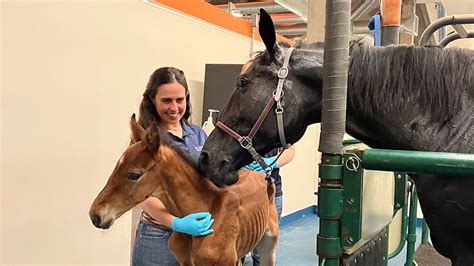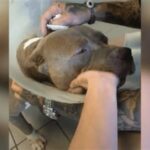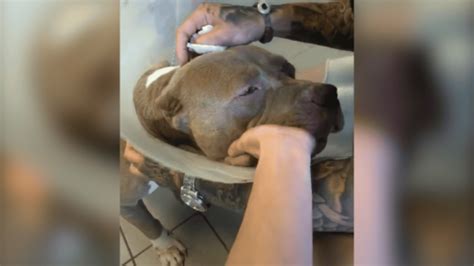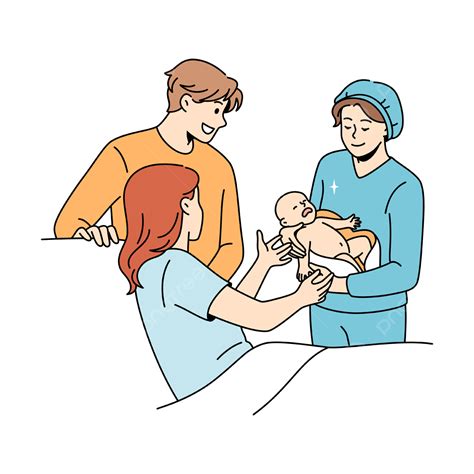
A nurse mare in Ocala, Florida, has formed a heartwarming bond with an orphaned foal, stepping in to provide the maternal care and nourishment the young horse desperately needed, creating a tender relationship that has captured hearts worldwide.
Ocala Nurse Mare Offers Solace to Orphaned Foal
OCALA, Fla. – In a touching display of interspecies connection, a nurse mare at a breeding farm in Ocala has adopted an orphaned foal, offering maternal care and a lifeline to the vulnerable young horse. The mare, whose own foal had been weaned, stepped in to nurture the orphaned foal, providing essential milk and companionship.
The heartwarming story began when the foal’s mother unexpectedly passed away, leaving the newborn without its primary source of nourishment and care. The farm staff, aware of the critical need for maternal support, introduced the foal to a nurse mare, a mare used to foster foals other than their own. The bond between the mare and the foal was instantaneous, with the mare readily accepting the orphaned foal as her own.
“She just took to him right away,” said a spokesperson for the farm. “It was like she knew he needed her.” The mare’s acceptance of the foal has not only ensured the foal’s survival but has also provided a much-needed emotional connection for the grieving animal.
The nurse mare’s role is crucial in the early development of foals, providing essential nutrients and antibodies through her milk. Additionally, the mare’s presence offers comfort, security, and socialization, which are vital for the foal’s emotional and behavioral development. The bond formed between the nurse mare and the orphaned foal is a testament to the powerful maternal instincts that exist in the animal kingdom.
The story has resonated with animal lovers worldwide, highlighting the compassion and empathy that animals are capable of exhibiting. The farm has been inundated with messages of support and admiration for the nurse mare and the staff who facilitated the adoption. The heartwarming bond serves as a reminder of the importance of compassion and care in the lives of all creatures.
The successful adoption of the orphaned foal is a testament to the dedication and expertise of the farm staff, who recognized the critical need for maternal support and acted swiftly to provide it. The farm has a long history of providing exceptional care for its horses, and this latest act of compassion further solidifies its reputation as a leader in equine welfare. The story of the nurse mare and the orphaned foal is a beacon of hope, demonstrating the power of compassion and the enduring bonds that can be formed between animals.
Background on Nurse Mares
Nurse mares play a vital role in the equine industry, particularly in the breeding of thoroughbred horses. These mares are specifically used to foster foals whose biological mothers are unable to care for them, whether due to death, illness, or rejection. The practice of using nurse mares ensures that valuable foals receive the necessary nutrition, care, and socialization during their critical early stages of development.
However, the use of nurse mares has also raised ethical concerns, particularly regarding the fate of the nurse mares’ own foals. In some cases, these foals are separated from their mothers shortly after birth, which can be distressing for both the mare and the foal. Animal welfare organizations have advocated for more humane practices in the use of nurse mares, including ensuring that the mares’ own foals are properly cared for and that the separation process is as stress-free as possible.
Despite the ethical considerations, nurse mares remain an essential part of the equine industry, providing a valuable service in ensuring the survival and well-being of orphaned or abandoned foals. The heartwarming story of the nurse mare in Ocala serves as a reminder of the compassion and empathy that animals are capable of exhibiting, and it highlights the importance of responsible and ethical practices in the use of nurse mares.
The Importance of Maternal Care in Foals
Maternal care is crucial for the healthy development of foals, both physically and emotionally. The mare provides essential nutrients and antibodies through her milk, which helps to protect the foal from infections and diseases. Additionally, the mare’s presence offers comfort, security, and socialization, which are vital for the foal’s emotional and behavioral development.
Foals that are deprived of maternal care are at a higher risk of developing health problems, behavioral issues, and social difficulties. They may also experience increased stress and anxiety, which can negatively impact their overall well-being. Therefore, it is essential to ensure that foals receive adequate maternal care, either from their biological mothers or from nurse mares.
The story of the orphaned foal in Ocala highlights the importance of maternal care in the lives of foals. The nurse mare’s acceptance of the foal has not only ensured its survival but has also provided a much-needed emotional connection for the grieving animal. This heartwarming story serves as a reminder of the powerful bond between a mother and her offspring, and it underscores the importance of providing maternal care to all foals in need.
Ethical Considerations and Welfare
The use of nurse mares is not without ethical considerations. One of the main concerns revolves around what happens to the nurse mare’s biological foal. Often, these foals are separated from their mothers very soon after birth, sometimes as early as 24-48 hours. The reason for this early separation is to allow the nurse mare to bond with and lactate for the foal she will be fostering.
This early separation can be extremely stressful for both the mare and her biological foal. Mares and foals form a strong bond within hours of birth, and breaking that bond can lead to distress, anxiety, and depression in both animals. The foals separated from their mothers may face challenges in their social and emotional development, as they miss out on crucial early interactions and learning experiences.
Another ethical concern is the potential for exploitation of nurse mares. These mares are often kept in a state of near-constant pregnancy and lactation, which can take a toll on their physical health. They may be subjected to repeated cycles of impregnation, foaling, and fostering, with little regard for their well-being. It’s essential to ensure that nurse mares are treated with respect and provided with adequate care, including proper nutrition, veterinary attention, and opportunities for rest and socialization.
In response to these ethical concerns, various organizations and individuals have advocated for more humane practices in the use of nurse mares. Some breeders are exploring alternative methods of foal rearing, such as using artificial milk replacers or finding ways to keep the mare and her biological foal together while also allowing her to foster another foal. There is also a growing emphasis on transparency and accountability in the industry, with breeders being encouraged to disclose their practices and ensure that the welfare of all animals is prioritized.
Alternative Foal Rearing Methods
While nurse mares have traditionally been used to raise orphaned or rejected foals, there are several alternative methods that can be employed to minimize the ethical concerns associated with nurse mare programs.
1. Artificial Milk Replacers: Advances in equine nutrition have led to the development of high-quality milk replacers that can provide foals with the necessary nutrients for healthy growth. These milk replacers are formulated to mimic the composition of mare’s milk and can be fed to foals using bottles or automatic feeders. While using milk replacers requires significant time and effort from caregivers, it eliminates the need to separate nurse mares from their biological foals.
2. Fostering with Other Mares: In some cases, it may be possible to find another mare who has recently lost her foal or who has a surplus of milk and is willing to foster the orphaned foal. This approach can be more challenging, as it requires finding a suitable mare and ensuring that she accepts the new foal. However, if successful, it can provide the foal with the benefits of natural maternal care without the ethical concerns associated with nurse mare programs.
3. Early Weaning and Intensive Care: Another option is to wean the foal early and provide intensive care, including specialized nutrition, veterinary attention, and socialization. This approach is typically used for foals who are strong and healthy but whose mothers are unable to care for them due to illness or injury. Early weaning requires careful monitoring and management to ensure that the foal receives the necessary support for healthy development.
4. Co-Fostering: This innovative approach involves allowing a mare to raise both her own foal and an orphaned foal simultaneously. This requires careful management and ensuring that the mare has sufficient milk and attention for both foals. However, it can be a more ethical alternative to traditional nurse mare programs, as it allows the mare to maintain a bond with her biological foal while also providing care for an orphaned foal.
Impact on the Equine Community
The story of the nurse mare and the orphaned foal in Ocala has resonated deeply within the equine community, sparking conversations about the ethical treatment of horses and the importance of responsible breeding practices. The heartwarming bond between the mare and the foal has served as a reminder of the compassion and empathy that animals are capable of exhibiting, and it has inspired many to advocate for better welfare standards for horses.
The story has also highlighted the crucial role that dedicated caregivers play in ensuring the well-being of horses. The farm staff in Ocala demonstrated exceptional compassion and expertise in recognizing the need for maternal support and facilitating the adoption of the orphaned foal. Their actions have been praised by animal welfare organizations and horse enthusiasts alike, underscoring the importance of responsible horse ownership and management.
Furthermore, the story has prompted discussions about the use of nurse mares in the equine industry and the ethical considerations associated with this practice. While nurse mares can provide a valuable service in ensuring the survival and well-being of orphaned foals, it is essential to ensure that their own foals are properly cared for and that the separation process is as stress-free as possible. The equine community is increasingly committed to finding more humane and ethical alternatives to traditional nurse mare programs, such as using artificial milk replacers or fostering with other mares.
The Significance of the Story
The narrative of the nurse mare embracing the orphaned foal extends beyond a simple act of animal adoption; it underscores profound lessons in empathy, community, and the inherent interconnectedness of life.
Empathy and Compassion: The nurse mare’s immediate acceptance of the orphaned foal is a powerful testament to the capacity for empathy within the animal kingdom. It challenges anthropocentric views that often underestimate the emotional depth and social intelligence of non-human beings. This display of compassion reminds us of the fundamental similarities we share with animals and calls for greater respect and ethical consideration in our interactions with them. The mare’s actions highlight that compassion isn’t exclusive to humans but is a vital component of many species’ social structures, crucial for the survival and well-being of their communities.
Community Support and Intervention: The story also celebrates the role of human intervention in fostering positive outcomes. The prompt and thoughtful actions of the farm staff in recognizing the orphaned foal’s needs and facilitating its adoption by the nurse mare demonstrate the significance of informed, compassionate caregiving. Their knowledge of equine behavior and their willingness to act swiftly and decisively were critical in ensuring the foal’s survival and emotional well-being. This aspect of the story emphasizes the responsibility humans have in creating supportive environments for animals, particularly in situations where natural support systems are disrupted.
Resilience and Healing: The bond formed between the nurse mare and the orphaned foal symbolizes resilience in the face of loss. Both animals experienced significant trauma – the foal losing its mother and the mare possibly the early weaning of her own. Their ability to form a new, nurturing relationship underscores the remarkable capacity for healing and adaptation that exists within living beings. This aspect of the story offers hope and inspiration, suggesting that even in the wake of profound loss, new connections can bring comfort and renewal.
Ethical Considerations and Animal Welfare: Moreover, the story serves as a catalyst for broader conversations about ethical considerations in animal husbandry and the welfare of animals used in agricultural or breeding contexts. While the immediate narrative is heartwarming, it prompts deeper reflection on the systemic practices that lead to situations where nurse mares are needed. It encourages stakeholders in the equine industry to consider the well-being of all animals involved, advocating for practices that minimize stress, prevent unnecessary separations, and promote the overall health and happiness of both mares and foals.
Educational Opportunities: Finally, the story presents valuable educational opportunities. It can be used in veterinary and animal science programs to illustrate the complexities of animal behavior, the importance of maternal care, and the ethical dilemmas inherent in modern breeding practices. It also offers a compelling narrative for educating the general public about the needs and vulnerabilities of horses, fostering greater awareness and support for animal welfare initiatives.
Conclusion
The story of the nurse mare in Ocala, Florida, is more than just a heartwarming tale; it is a complex narrative that touches on themes of empathy, community, resilience, and ethical responsibility. It reminds us of the profound connections that can exist between animals and humans, and it challenges us to strive for more compassionate and sustainable practices in our interactions with the natural world. By celebrating the bond between the nurse mare and the orphaned foal, we can inspire greater awareness, advocacy, and action in support of animal welfare and responsible stewardship of the earth.
Frequently Asked Questions (FAQ)
1. What is a nurse mare, and why are they used in horse breeding?
A nurse mare is a mare used to foster foals that are not her own, typically because the biological mother is unable to care for the foal due to death, illness, rejection, or other reasons. They are particularly common in the breeding of thoroughbred horses, where valuable foals need to receive adequate nutrition and maternal care to ensure their healthy development.
2. What are the ethical concerns associated with the use of nurse mares?
The main ethical concern involves the fate of the nurse mare’s own biological foal. These foals are often separated from their mothers shortly after birth, causing distress to both animals. Additionally, concerns exist about the potential for exploitation of nurse mares, who may be subjected to repeated cycles of impregnation, foaling, and fostering with little regard for their well-being.
3. What happens to the biological foal of the nurse mare after separation?
The fate of the biological foal can vary. Some are raised on artificial milk replacers, while others may be fostered by another mare if one is available. Sadly, in some instances, particularly if the foal is a male and not considered valuable, they may be sold for slaughter. This practice is a significant source of ethical debate.
4. Are there alternatives to using nurse mares for orphaned foals?
Yes, several alternatives exist, including using artificial milk replacers, fostering the foal with another mare who has lost her own, early weaning with intensive care, and co-fostering, where a mare raises both her own foal and an orphaned foal simultaneously.
5. How can I support ethical practices in horse breeding and the use of nurse mares?
You can support ethical practices by choosing to buy horses from breeders who prioritize the welfare of all their animals, including nurse mares and their foals. You can also support organizations that advocate for more humane treatment of horses and promote responsible breeding practices. Look for breeders who are transparent about their practices and committed to the well-being of all animals in their care. You can also advocate for stronger regulations and oversight of the equine industry to ensure that welfare standards are upheld.









